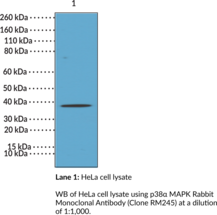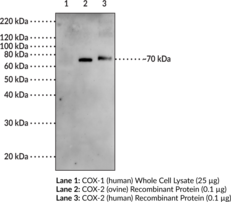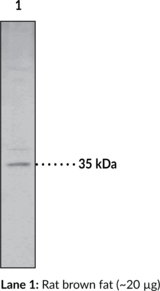Description
p38 MAPK is a serine/threonine protein kinase and member of the MAPK family with roles in the regulation of immune responses and embryonic development, as well as cell differentiation, metabolism, and survival.{60066,60067} It exists as 4 isoforms, p38α, -β, -γ, and -δ, encoded by MAPK14, MAPK11, MAPK12, and MAPK13, respectively, in humans. p38α MAPK is ubiquitously expressed, with the highest levels of expression in heart, skeletal muscle, and brain.{60066,60068} It is activated via dual phosphorylation of threonine 180 and tyrosine 182 by the MAP2K kinases MKK3 and MKK6 in response to LPS or the production of inflammatory cytokines.{60066,60067} Downstream signaling targets of p38α MAPK include protein kinases, transcription factors, and transcriptional regulators, among others.{60067} Knockdown of Mapk14 is embryonic lethal, while macrophage-specific deletion of Mapk14 inhibits inflammatory cytokine production and is protective against cecal ligation and puncture-induced sepsis in mice.{60067,60068} Mapk14 knockdown also increases lysosomal degradation of β-secretase 1 (BACE1) and decreases amyloid-β (Aβ) production in the APP/PS1 double transgenic mouse model of Alzheimer’s disease.{60069} Cayman’s p38α MAPK Monoclonal Antibody (Clone RM245) can be used for immunohistochemistry (IHC) and Western blot (WB) applications. The antibody recognizes p38α MAPK at approximately 38 kDa from human samples.
Synonyms: MAPK14|Mitogen-activated Protein Kinase 14|Mitogen-activated Protein Kinase p38α|Stress-activated Protein Kinase 2A
Immunogen: Peptide corresponding to p38α MAPK (300-360)
Formulation: 100 µl protein A-purified monoclonal antibody
Isotype: IgG
Applications: IHC, WB
Origin:
Stability: 365 days
Application|Immunohistochemistry||Application|Western Blot||Product Type|Antibodies|Monoclonal Antibodies||Research Area|Cardiovascular System|Heart||Research Area|Cell Biology|Cell Signaling|p38 MAPK Signaling||Research Area|Epigenetics, Transcription, & Translation|Transcription Factors||Research Area|Immunology & Inflammation|Innate Immunity|Sepsis/Shock||Research Area|Neuroscience|Neurodegenerative Disorders|Alzheimer’s Disease




